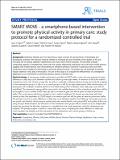| dc.contributor.author | Glynn, Liam G. | |
| dc.contributor.author | Hayes, Patrick S. | |
| dc.contributor.author | Casey, Monica | |
| dc.contributor.author | Glynn, Fergus | |
| dc.contributor.author | Alvarez-Iglesias, Alberto | |
| dc.contributor.author | Newell, John | |
| dc.contributor.author | Ó Laighin, Gearóid | |
| dc.contributor.author | Heaney, David | |
| dc.contributor.author | Murphy, Andrew W. | |
| dc.date.accessioned | 2017-03-31T10:22:16Z | |
| dc.date.available | 2017-03-31T10:22:16Z | |
| dc.date.issued | 2013-05-29 | |
| dc.identifier.citation | Glynn, LG,Hayes, PS,Casey, M,Glynn, F,Alvarez-Iglesias, A,Newell, J,OLaighin, G,Heaney, D,Murphy, AW (2013) SMART MOVE - a smartphone-based intervention to promote physical activity in primary care: study protocol for a randomized controlled trial. Trials, 14(1), 157. doi: 10.1186/1745-6215-14-157 | en_IE |
| dc.identifier.issn | 1745-6215 | |
| dc.identifier.uri | http://hdl.handle.net/10379/6416 | |
| dc.description.abstract | Background: Sedentary lifestyles are now becoming a major concern for governments of developed and developing countries with physical inactivity related to increased all-cause mortality, lower quality of life, and increased risk of obesity, diabetes, hypertension and many other chronic diseases. The powerful onboard computing capacity of smartphones, along with the unique relationship individuals have with their mobile phones, suggests that mobile devices have the potential to influence behavior. However, no previous trials have been conducted using smartphone technology to promote physical activity. This project has the potential to provide robust evidence in this area of innovation. The aim of this study is to evaluate the effectiveness of a smartphone application as an intervention to promote physical activity in primary care.Methods/design: A two-group, parallel randomized controlled trial (RCT) with a main outcome measure of mean difference in daily step count between baseline and follow up over eight weeks. A minimum of 80 active android smartphone users over 16 years of age who are able to undertake moderate physical activity are randomly assigned to the intervention group (n = 40) or to a control group (n = 40) for an eight week period. After randomization, all participants will complete a baseline period of one week during which a baseline mean daily step count will be established. The intervention group will be instructed in the usability features of the smartphone application, will be encouraged to try to achieve 10,000 steps per day as an exercise goal and will be given an exercise promotion leaflet. The control group will be encouraged to try to walk an additional 30 minutes per day along with their normal activity (the equivalent of 10,000 steps) as an exercise goal and will be given an exercise promotion leaflet. The primary outcome is mean difference in daily step count between baseline and follow-up. Secondary outcomes are systolic and diastolic blood pressure, resting heart rate, mental health score using HADS and quality of life score using Euroqol. Randomization and allocation to the intervention and groups will be carried out by an independent researcher, ensuring the allocation sequence is concealed from the study researchers until the interventions are assigned. The primary analysis is based on mean daily step count, comparing the mean difference in daily step count between the baseline and the trial periods in the intervention and control groups at follow up. | en_IE |
| dc.description.sponsorship | This study was funded by the EU Northern Periphery Program through the Implementing Transnational Telemedicine Solutions (ITTS) project (reference number 7.13). | en_IE |
| dc.format | application/pdf | en_IE |
| dc.language.iso | en | en_IE |
| dc.publisher | BioMed Central | en_IE |
| dc.relation.ispartof | Trials | en |
| dc.rights | Attribution-NonCommercial-NoDerivs 3.0 Ireland | |
| dc.rights.uri | https://creativecommons.org/licenses/by-nc-nd/3.0/ie/ | |
| dc.subject | Smartphone | en_IE |
| dc.subject | iPhone | en_IE |
| dc.subject | Cell phone | en_IE |
| dc.subject | Mobile phone | en_IE |
| dc.subject | Exercise | en_IE |
| dc.subject | Physical therapy | en_IE |
| dc.subject | Application | en_IE |
| dc.subject | Step counter | en_IE |
| dc.subject | Pedometer and primary care | en_IE |
| dc.subject | Health care | en_IE |
| dc.subject | Pedometers | en_IE |
| dc.subject | Adults | en_IE |
| dc.title | SMART MOVE - a smartphone-based intervention to promote physical activity in primary care: study protocol for a randomized controlled trial | en_IE |
| dc.type | Article | en_IE |
| dc.date.updated | 2017-03-27T13:27:03Z | |
| dc.identifier.doi | 10.1186/1745-6215-14-157 | |
| dc.local.publishedsource | http://dx.doi.org/10.1186/1745-6215-14-157 | en_IE |
| dc.description.peer-reviewed | peer-reviewed | |
| dc.contributor.funder | |~| | |
| dc.internal.rssid | 4684458 | |
| dc.local.contact | Gearóid Ó Laighin, Electronic Engineering, Room 3049, Engineering Building, Nui Galway. 2685 Email: gearoid.olaighin@nuigalway.ie | |
| dc.local.copyrightchecked | No | |
| dc.local.version | ACCEPTED | |
| nui.item.downloads | 382 | |


